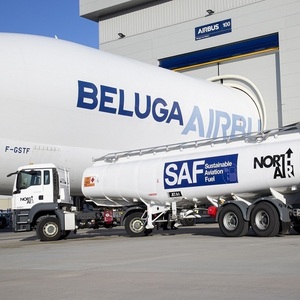Air bp scores a hattrick of SAF projects at 3 new UK locations

SOURCE: Air BP
April 13, 2021
BY Air BP
Air bp, the international aviation fuel products and service supplier, has recently supplied sustainable aviation fuel (SAF) to three airports in the UK: dedicated business aviation airport, London Biggin Hill (BQH), Airbus owned Hawarden (CEG) airport in Flintshire, North Wales, which will be used for fuelling of the Beluga aircraft, and Centreline FBO, in Bristol (BRS). All three locations expect to have SAF available on an ongoing basis. These latest supply agreements demonstrate the importance of collaboration between fuel supplier, airport and customer in driving demand for SAF and ultimately help to meet the industry’s lower carbon goals.
The SAF supplied by Air bp is made from waste based sustainable feedstocks such as used cooking oil which is blended with traditional jet fuel. The SAF blend supplied is around 35 percent SAF and the SAF component provides a lifecycle carbon reduction of around 80 percent compared to traditional jet fuel it replaces.
Andreea Moyes, sustainability director, Air bp, said, “We are excited to see these ongoing commitments to SAF supply. Stakeholders’ willingness to invest in SAF and collaborate with us will help drive demand and deliver carbon reductions compared to the traditional jet fuel it replaces. We are committed to working with stakeholders to explore the viable sale and purchase of SAF, which we believe is one of the aviation industry’s key routes to reducing carbon emissions.”
Stephen Elsworthy, manager of fuel services at London Biggin Hill Airport, says, “By offering Air bp’s sustainable aviation fuel to all our customers and resident businesses, we are helping them to meet their sustainability goals too, and vitally, contributing to our industry’s aim for a net zero carbon future.”
Advertisement
Advertisement
Gus Paterson, chief operating officer of Centreline’s parent company Pula Aviation Services Ltd., says, “In response to growing demand, we’re delighted to be able to offer SAF to our customers and to support global efforts to decarbonise aviation. Air bp is fully committed to supporting its FBOs in understanding SAF and the impact and opportunities it can have for their business and ultimately identifying opportunities for SAF supply.”
Air bp was involved in fuelling the first SAF flight by an airline in February 2008 and since then has been enabling ground-breaking test flights and investing in sustainable alternative fuels.
Advertisement
Advertisement
Related Stories
Avfuel Corp., the leading independent supplier of aviation fuel and services, is expanding its sustainable aviation fuel (SAF) footprint with the addition of a new, strategic supply point in Denver, Colorado—the first of its kind in the region.
CVR Energy Inc. on July 30 reported its renewables segment achieved increased throughput during Q2 despite unplanned downtime but reported a net loss of $11 million. The company expects to retroactively claim the 45Z credit for volumes produced.
Total U.S. operable biofuels production capacity expanded in May, with gains for renewable diesel and a small decrease for ethanol, according to data released by the U.S. Energy Information Administration. Feedstock consumption was up.
SAF-producer XCF Global Inc. on July 28 announced it has signed an exclusive, non-binding indication of intent (IOI) with a renewable fuels infrastructure and feedstock solutions company based in the western U.S.
The abrupt closure announcement by Biox Corp. is the latest example of a failure to secure Canada's domestic energy supply, says Unifor. The Canadian energy union is advocating for simply regulatory changes that could help restart the facility.
Upcoming Events










